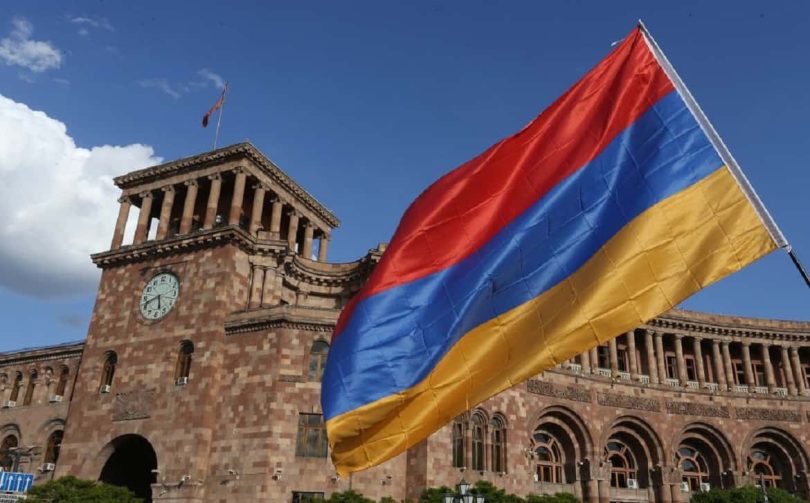Armenians find themselves badly scarred after losing last autumn’s Second Karabakh War to Azerbaijan. As of this writing, and following the November 2020 “Armistice,” Armenia continues to endure the incursion and occupation of about two thousand Azerbaijani soldiers on internationally recognized Armenian territory.
Azerbaijan is currently using all its military, psychological and diplomatic tools to force Armenia to sign a peace treaty that rests heavily in the former’s favor. Armenia has lost much of its perceived sovereignty and is thus ignored by its allies. Allies are earned, not gifted. These global circumstances and Armenia’s ineffectiveness have put Armenia itself in a critical condition.
Armenia has a historical mandate; the survival of what little remains of its lands, culture, and heritage in a hostile geopolitical setting. This challenging goal could be achieved by the Armenian state by providing maximum security for its citizens, utilizing its diaspora’s strategic value, and being diplomatically savvier than its enemies. Armenia has not fulfilled this obligation, nor has even come close. Thirty years ago, Armenian leaders took the easy way out, and Armenians are paying the price today.

As the Soviet Union dissolved, the leaders of Armenia, a combination of ex-KGB and Cowboy Capitalists, set the state’s societal course for the next thirty years, based on regressive historical determinism. It was assumed that Armenians have historically been unable to generate the required sovereignty maximizing their ability to counter the regional forces aimed at their degeneration and that temperament has not changed. It is one thing to think Armenia could magically win reparations for the Turkish genocide of the Armenians and just as absurd to suggest that if Armenia buries its head in the sand, nobody will notice this miniscule state. Armenia’s enemies and allies have most certainly noticed. The die, cast thirty years ago, has been refined along the way. Armenia’s leaders appear reluctant about teaching its society what is necessary to survive in inhospitable geography, nor does native Armenian society want to hear it.
Rather than instituting a society where national security is the mantra, Armenian leaders established a system quickly adapted to by a post-Soviet population. The laissez-faire structure created was characterized by unequal law enforcement tilted toward the rich and powerful, with society following in its path. The individual goal was maximizing one’s fortune. While this might be the goal of most individuals, it will fail as a national policy when such intent supplants law enforcement, education, economic planning (equated with the Soviet Union), demographic stability, military preparedness, and base-level civil discipline. Systems without transparent checks and balances; that lack personal responsibility; and that are run by near Mafia-like precision cannot serve such a mandate. They do serve other interests. How can an enlisted Armenian be guaranteed he won’t be shot in the back by “friendly fire” if a fellow soldier is paid handsomely enough?
A citizen will never know if a military procurement is in the State’s best interest — rather than the arms dealers’ — if the primary accepted motivation is personal profit. How can an Armenian citizen know if a civil servant is serving the Armenian national interest rather than a foreign interest, as a white-collar mercenary, if the civil servant is paid enough? In Yerevan, rumors abound — but shouldn’t exist — since democracy’s prerequisite is transparency. Reach your own conclusions.
State security remains a topic discussed in smoke-filled rooms, and to what degree remains unknown. Instead, conspicuous consumption and the accumulation of wealth have replaced even a minimum level of patriotism. A patriot is an individual who has the propensity to serve the interests, ultimately, of a grand national strategy1. Patriotism is null and void if it lacks adherence to a grand national strategy. Patriotism requires mechanisms for its effectiveness, mainly involving civic obligations rather than flag-waving. One need not even invoke Rousseau’s social contract argument, for one can look at the instance of war. Soldiers defend a nation through battle. Soldiers must have a solid sense of patriotism, take personal risks, and believe in some vision greater than themselves. The same is not valid for mercenaries. Patriotism is measured by the extent to which citizens identify with the state, its values and participate in maintaining and advancing its strength by serving the wider community. Patriotism encourages public discourse and a more efficient running of the state. If this participation is discouraged, so is the connection between the state and its citizens. No nation-state can succeed when its citizens make their own rules and state structures serve personal interests. By the late 1990s, Armenian leaders promulgated the fallacy that a national ideology was an imaginary structure. Let us be clear: There cannot be a grand national strategy upon which all modern states are built if there is no national ideology. It is unclear what universe these late-Soviet period academics, including Armenia’s first president, Levon Ter-Petrosian, lived in. Today’s Armenian Prime Minister Pashinyan is a Ter-Petrosyan disciple. Armenia’s enemies see these policies, and the outcome of the Second Karabakh War was one of the results of enforcing such policies.
Post-Soviet Armenian society adapted to the easiest way out, encouraged by an un-patriotic current feeding into Armenian individualism. If a system is established on theft and thuggery that results in the existence of big oligarchs, and the society adapts to such a scenario, it is in the interest of the oligarchs to keep that system intact. In sharp contrast, the average patriotic citizen might start asking questions and demand governmental transparency with checks and balances in place. Such a patriot might ask why the elementary education system is still a holdover from Soviet days (in attitude, at least). A patriot might ask why some people get away with murder, and while others face red tape, questionable fines and traffic tickets. A patriot might ask why the military and state security infrastructures are opaque. Removing such defective practices from national life will lead to a more vibrant state.
Ironically, I would conjecture that the Soviet-era Sardarapat Memorial, a symbol of national pride and survival, would not have been built after Armenia’s 1991’s independence. Similarly, a less impressive Genocide Memorial would exist, not matching the grandeur of the Soviet-era complex. Few Armenian flags wave in Armenia today, and few national monuments have been constructed there since the fall of the Soviet Union.
Of vital importance to the state is its diplomatic prowess. A state’s diplomatic corps is an institution that is developed and refined over time. It has almost no effectiveness when diplomats and foreign ministers are transactional political appointees — like interns — not part of a culture that serves a national ideology, assuming one exists. Diplomatic acumen and relations take time to mature. Armenia’s soon-to-be Foreign Minister, Armen Grigoryan, has no diplomatic experience. The same goes for Armenian Prime Minister Pashinyan. Poor diplomatic expertise does not lend itself to being an effective negotiator; in fact, quite the opposite.
Civil attitudes towards the state and what it represents are critical to national security. The country’s ability to withstand existential threats is founded on societal strength as much as it does leadership. In long-standing issues, such as frozen disputes, societal resilience counters eventual demoralization.
It is beyond the scope of this article to engage in a comparison of three decades of strategic changes and maneuvers in the Southern Caucasus and broader region. However, it suffices to state that because Armenians won the First Karabakh War, which ended in a 1994 cease-fire, Armenian society became complacent with a perception as a winner and never bothered to pursue a peace treaty with Azerbaijan at the time, when the iron was hot. Some reasons for this include inadequate diplomacy and but mainly a lack of grand national strategy. Armenian leaders and oligarchs were enriching themselves at the expense of time.
Just as everyone with a keyboard has opinions, I will state some suggestions.
– No clear national vision (ideology) for Armenia exists; strategic actions are transactional. A clear grand national strategy must be published and continuously refined.
– Every ministry and civil infrastructure must be responsible to the citizens, and not simply answer to a prime minister or some appointee. If the Armenian constitution requires a change, so be it. Today is the Internet era; the days of hiding behind a bureaucratic infrastructure must be eliminated. Armenia must move its society away from laissez-faire lifestyles which lack direct personal responsibility for what happens to the collective. These behaviors are void of essential discipline, endowed with a false hope that somebody else will do the heavy lifting.Something is wrong when the vanity of one automobile license plate number determines how the motorist is treated and how this motorist treats others.
– Armenia must utilize the best and brightest available within Armenia, as well as from its diaspora, even if doing so exposes endemic incompetence. Wars have been lost for less. Members of Parliament must never be permitted to serve if their business and personal affairs create a conflict-of-interest.
– Armenians must reach a base level of discipline that will result in citizen activity not being detrimental to the state’s greater good. The State’s ability to enforce the rule of law — with all citizens being equal in the eyes of the law – must be basic requirements
– Armenia must revamp its military, security, defense, and diplomatic structures to meet the demands of the 21 century and to address the needs of a grand national strategy.Armenia is not in Europe where, after two successive world wars, the incentive for peaceful inter-state coexistence continues. Armenians must adjust themselves to their actual environment.
– When a minimum of these requirements is met, Armenia will have begun to take an active role in its security, moving away from inexperienced, incompetent, oligarchic, laissez-faire, personality-based leadership. Addressing this mandate is more challenging today since Armenia’s current power centers have a vested interest in extending Armenia’s thirty-year degeneration.
Yerevan, Armenia
1 See (English) Armenia’s Existential Threats and Strategic Issues, May 2020 page 13 (Armenian) Հայաստանի դեմ գոյացական սպառնալիքները և ռազմավարական հարցերը, Մարտ 2020, page 15
Author: David Davidian (Lecturer at the American University of Armenia. He has spent over a decade in technical intelligence analysis at major high technology firms. He resides in Yerevan, Armenia).



